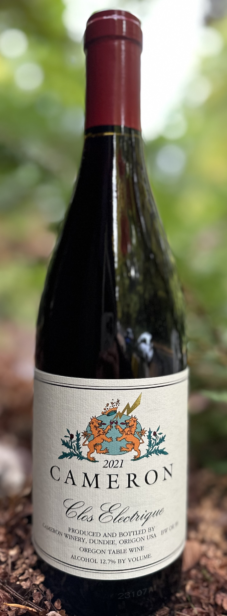Cameron Wines are gluten free!
From John, March 30th, 2012In our world In our world of increasingly diverse dietary requirements, questions are inevitably proffered regarding wine and its compatibility with specific eating regimes. And right off the front I would like to declare that Cameron wine (and all wine to my knowledge) is gluten-free! But what about the vegetarians and vegans?
In the first case, vegetarians, the main and possibly only issue would be use of fining agents, those items added to wine during the aging process to aid in clarity, mouth feel or aromatics. While many of these agents are inorganic (such as bentonite for removing protein or copper sulfate for removing sulfides…the aroma of rotten eggs), some agents are animal-derived proteins. Amongst these one would find egg whites, albumin (derived from eggs), isinglass (from sturgeon swim bladders), milk, casein (derived from milk) and beef blood. Most of these proteinaceous concoctions are meant to help remove tannins from the wine, particularly red wines. Therefore vegetarians generally do not have to be concerned about white wines. At Cameron Winery we do occasionally use egg whites obtained from chickens grown on our estate (see below) to fine various batches of Pinot noir that are considered slightly too bitter or astringent. In many vintages, the wines are sufficiently soft in their own right that no fining is necessary but occasionally a vintage pops up, particularly from a warm year, when some vineyard lots produce wines that need a little softening up! In this case, our flock cheerfully donates their eggs to the cause. So if you are an ovo vegetarian, drink our Pinot noir with gusto.
Veganism is a much more complex story since among this group there exist many different subgroups including ethical vegans, dietary vegans and environmental vegans.* My admittedly limited understanding of these groups would place the latter two in a comfortable position regarding the wines of Cameron while the first is more problematical. That is because Cameron is a farm with a philosophy centered on operating as a “closed loop” which is by far the most environmentally sensitive and sustainable approach to agriculture.
Our approach to farming relies on recycling everything produced on the farm and part of the recycling effort necessarily involves animals. Let us begin with our chickens that are lovingly confined to “chicken tractors” that roll up and down the vineyard rows giving the chickens fresh ground daily in which to pull up greens, eat grubs and scratch the soil. In return they provide nitrogen and other nutrients to the vineyard while being protected from predatory hawks and owls. They also occasionally donate their eggs for fining the red wines at Cameron (see above). Similarly the geese range freely around the vineyard pulling up greens and fertilizing the soil…geese are tough enough to fend for themselves so we do not have to defend them. Our goats provide the pulse of the farm, commenting on whatever is going on and sampling whatever plants we make available to them. Their principal occupation is blackberry removal and mowing down cover crop in the winter months. We collect all of their barn “contributions” for our compost pile, which is markedly improved by the addition of this animal matter. Finally there is the matter of our beehives, sites of whirling activity fertilizing the cover crop in the vine rows, pollinating the cherry and apple trees and collecting pollen from the hazelnuts. They are an integral part of the overall health of the farm. And for ethical vegans who have declared beehives to be “enslavement of bees” quite frankly, you know not what you say: the bees are free to go anytime they want and on rare occasions, they do “swarm” and send part of their tribe elsewhere. The next time that you bite down on a cherry, a plum, an apple or a pear, consider that these would not be sitting in your hand without the aid of colonies of bees. And I can truthfully tell you that before we obtained a hive, our cherry trees did not yield any fruit because natural colonies are few and far between. I would assume that ethical vegans do not own cats or dogs or other domestic animals since this would constitute enslavement of animals similar to what we engage in here on our farm with chickens, goats, geese and bees. The problem is that without all of these pieces in place it would not be possible to run the farm as a closed recycling system.
*Environmental veganism rejects the use of animal products on the premise that the industrial practice is environmentally damaging and unsustainable. Dietary vegans eliminate animal products from their diet only. Ethical vegans reject the commodity status of animals and the use of animal products for any purpose
Share ThisRecent News & Rants
old vines, old wines & an old winemaker
One of the advantages of being an “old-timer” in the world of enology and viticulture is that our vines have aged along with me. It is a well known phenomenon in the world of wine that old vines tend to produce superior wine. A recent tasting of 18 vintages of Clos Electrique Blanc magnums proved that adage to be true! Overall, the consensus was that 8-14 years of aging seems to be the absolute “sweet spot” for this magnificent vineyard.
There’s More... >What do winter cold snaps do to the vineyard?
With climate progressively changing, one phenomena that is starting to occur fairly regularly is an occasional bout of intense winter cold weather. In January 2024, temperatures descended to as low as 4F in high altitude vineyards. Read on to learn how grapevines respond to this stress.
There’s More... >Cheers to a fantastic year ahead!
Bottles of Cameron Winery wine that are currently for sale.
2022 Dundee Hills Chardonnay, 2021 White Oak Pinot noir, 2021 Abbey Ridge Pinot noir, 2021 Clos Electrique Rouge, 2021 Clos Electrique Blanc, 2022 White […]
There’s More... >


